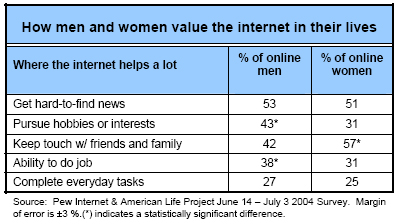Introduction
The Pew Internet Project has probed some of the softer issues surrounding men’s and women’s internet use. Over the years, we have asked a variety of questions about users’ awareness of internet issues and developments, and about their general interest in technology and the internet. We have asked about users’ perceived aptitude and self-confidence in dealing with computers and software, the internet and applications. We have also asked users about their attitudes toward the internet and the value it adds to their lives.
The data we have collected suggest men are more interested and aware about the world of technology and how their own systems work, from computers to internet connections. They try more new things, from hardware to software. As a natural consequence, men are more adept about dealing in the tech world, from installing filters to troubleshooting repairs. And they are more confident, in their roles as techies and geeks.
Men and women share an appreciation of what the internet does for their lives, particularly in making their lives more efficient and expanding their world of information. Men seem to value these strengths most in the context of the activities of their lives, from jobs to pastimes, while women seem to value them most in the context of the relationships in their lives, with family, friends, colleagues, and communities.
Tech terminology and issues: More men than women are familiar with tech terms and issues.
In June 2005, we asked internet users if they had a good idea of what various new technology terms means. Men reported being significantly more knowledgeable than women for every one of the following terms: spam, spyware firewall, internet cookies, adware, internet phishing, podcasting, and RSS feed.
In February 2004, twice as many men, 36%, as women, 18%, had heard of Voice over Internet Protocol, or VOIP service.
In June 2004, significantly more men, 43%, than women, 32%, were aware of the difference between paid or sponsored and unpaid ads.
In August 2001, significantly more men, 41%, than women 27%, said they had heard a lot about the recent financial problems of internet or dotcom companies. By contrast, significantly more women had heard only a little or nothing at all.
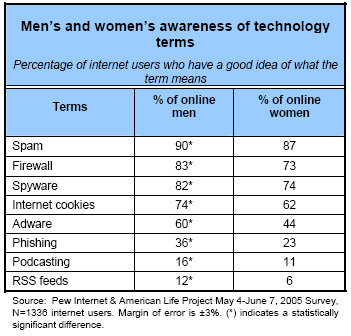
In February-March 2004, significantly more men, 50%, than women, 36%, said they were aware that Congress had recently passed anti-spam legislation. In January 2005, significantly more men, 36%, than women, 26%, said they had heard or read “a lot” about spam.
Software: More men take the lead on computer maintenance.
In June 2005, significantly more men than women said they are the main person responsible for maintaining the home computer. Further, more men than women have installed software on their home computers.
Of those who said they had virus protection on their home computers, significantly more men than women said they were responsible for setting up the protection.
Men have dealt with computer problems more thoroughly than women. In June 2005, of the two-thirds of users who said they had experienced some kind of problem with their computers in the past year, significantly more men, 44%, than women, 34%, said they knew the source of the problem and tried to fix it themselves. More women than men asked a friend or family member or colleague for help.
Men reported they were more successful at solving the problem, regardless of the manner they fixed it; 53% of men and 43% of women said the problem was solved “quickly and easily.”
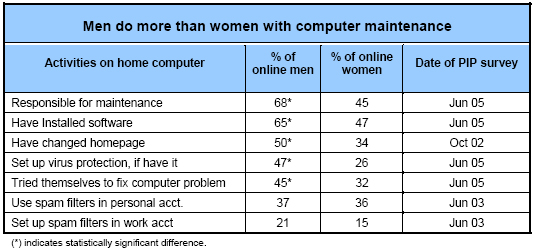
In June 2003, we asked about spam filtering. More men than women who have email accounts at work said they applied their own filters to block or manage spam on them, while equal numbers of men and women said they used filters on their personal accounts.
In October 2002, significantly more women, 14%, than men, 8%,said they didn’t know if the homepage that first appeared when they fire up the computer is one provided by their ISP or computer maker. More men than women said they had changed that page for their home computers at some point.
Internet access: More men are knowledgeable about their internet access, and more of them either have or would like to have high speed internet access.
In February-March 2004, we asked users who go online at work if they knew what kind of internet connections they had at work. Significantly more women, 22%, than men, 10%, said they didn’t know if they had high speed connections or dial-up connections.16 In the same survey, more men than women said they had high speed connections.
Nearly all internet users were aware of the kind of internet connections they had at home. Significantly more men than women had some kind of high speed connections at home.
Further, women were not as interested as men in making an upgrade from slow to fast connections: Of those with dial-up connections, significantly more men than women said they were interested in getting high speed connections.
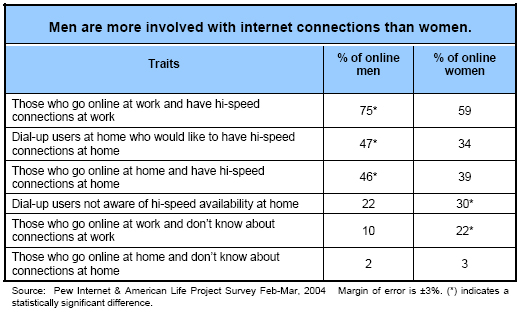
Women also knew less about the availability of high speed access in their homes: Significantly more women than men said they didn’t know if high-speed service was available or if there were multiple providers in their area.
Similarly, in November 2004, we asked if people had computer networks linking their computers together at home. Again, significantly more women, 13%, than men 4%, said they did not know. And again, more men, 54%, than women, 45%, said they did have home networks.
Pushing the edge: More men than women try the new technologies.
In February 2004, more men than women had made a telephone call over the internet. In November 2004, more men than women and had logged onto the internet using a wireless device. In the same month, equal numbers of men and women had cell phones, 65%.
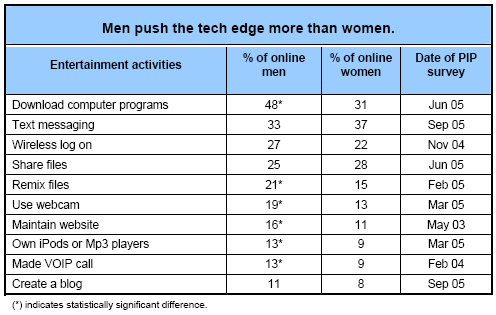
In March 2005, men were more likely than women to view live images from a webcam and to have iPods or MP3 players — although, as owners, equal numbers, 29%, have downloaded podcasts on them.
In September 2005, men were more likely than women to create a blog. In April – May 2003, more men than women maintained their own websites. In February 2005, more men than women had taken material like songs, images or text to remix into own artistic creation.
In January 2005, 58% of men and 47% of women said they know how to upload images or other files to a website so others could see them. Also, more men than women reported doing the following creative endeavors for the web: writing, 19% v 14%; artwork, 7% v 4%; audio files 8% v 3%; video files, 5% v 2%, and photography, 22% v, 19%. Only the last is not statistically significant.
In June 2005, men were significantly more likely than women to download many kinds of files: video files, 22% v. 13%; music files, 30% v 20%; computer programs, 48% v 31%; download or share adult content, 6% v 3%. They are equally likely to download screensavers, 23% v 24%; computer games, 22% v. 19% and to share files, 25% v. 28%.
Teen girls are breaking the online mold for women.
A November 2004, survey with American teen-agers shows that the youngest female internet users are trying out the newest and more challenging online technologies as much as boys are. Teen age girls may do more or less than boys of certain activities, like downloading, but the important message is that the technology is not standing in their way.
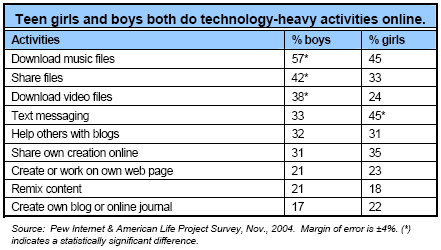
Confidence: Men have more confidence about dealing with computers and technologies than women.
In June 2005, we asked about online Americans’ confidence of keeping things like computer viruses, spyware, and adware off home computers. Significantly more men, 22%, than women, 17%, said they were “very confident” they could do this.
In June 2004, significantly more men, 54%, than women, 40%, said they were confident in their abilities as searchers.
Those not online: Lack of interest dominates, especially among women.
In the spring of 2002, we asked non-users about some of the reasons for not going online. Women were significantly more likely than men to cite many possibilities as “major reasons” they didn’t use the internet: they didn’t need it; didn’t want it; were worried about online porn, credit card theft, and fraud; said it is too expensive; and too complicated and hard to understand. Equal numbers of men and women said they didn’t have time.
We asked these same non-users if they would be interested to start using the internet or email. Significantly more men, 19%, than women, 10%, said they would be interested, and more men, 46%, than women, 35%, said they would probably start using the internet some day.
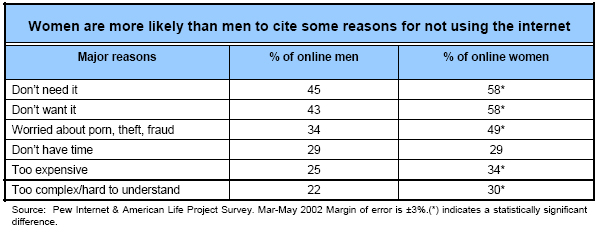
In June 2005, in a variation of the earlier question, we asked non-users to identify the main reason they were not online. Similar numbers of men and women, about one third, say they are just not interested. Another third, including significantly more women, 37%, than men, 25%, cite lack of access as their main reason. The remaining third cite a variety of other reasons: the internet is too difficult or frustrating, too expensive; they are too busy; they think it’s a waste of time.
Risks and fear: Women harbor more fears about online risks and dangers than men do.
Over the years, the Pew Internet Project has asked about fears and anxieties about being online. Overall, more women than men have expressed concerns about the online environment. Women are much more concerned than men about the internet enabling crimes in general. Men and women share similar concerns over personal privacy and personal threats, although women show more concern in two particular areas: dangers from spam and trespassing on personal health issues.
In February 2001, women expressed much more concern than men about criminals using the internet to plan and carry out their crimes, including ones about child pornography, credit card theft, organized terrorism, destructive computer viruses, wide scale fraud, computer hacking into government and business networks, web sites and files, and computer hacking into business networks.
The newest threat, spyware, concerns men and women equally. About three-quarters of both men and women said they considered it a serious problem if programs installed or websites they visited on their computers reported back to a source about their internet habits. And half of both men and women who are internet users say that spyware is a serious threat to their online security.
In June 2003, significantly more women than men were bothered by some harms they feared might come from unsolicited emails, including possible damage to computers and concern that their privacy might have been compromised.
In June 2000, we asked about some personal concerns: About half of both men and women said they were confident that the things they did online were private and not used without their permission. They worried equally about most things: hackers getting personal credit card information (just over 40%) and someone learning personal things from what they have done online (just over 30%); and less than 20% about downloading viruses, others tracking their web site visits, that their email would be read by unintended recipients.
In August 2000, we asked more personal privacy questions about health care in particular. Despite this being an area where women are much more active online than men, they also expressed much more concern about the risks. Women feared more than men that employers might find out about sites they were visiting, that health insurance companies might as well, and alter their policies because of it, and that sites might sell or give away information about what they did online. And finally, when asked how they would feel if health care providers put medical records on a password protected, secure web site, 65% of women and 55% of men agreed that would be a bad thing because others might be able to access the information.
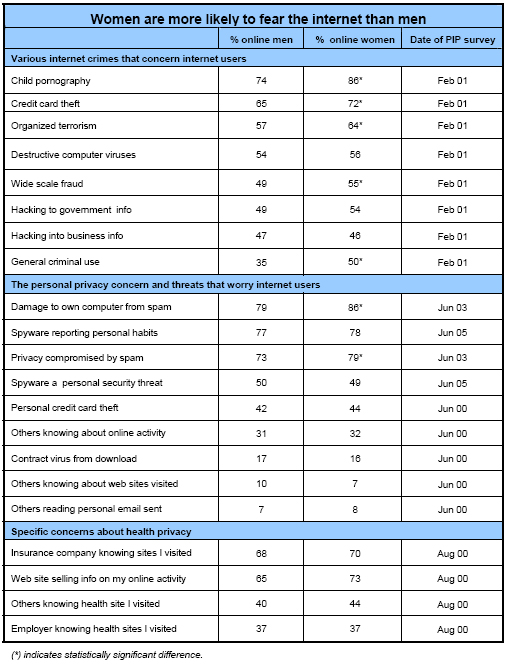
Valuing the internet: Men and women value the internet for a few different reasons.
At various times, the Pew Internet Project has asked users how they feel about the internet — how and where it helps them in their lives, or what they’d miss about it if it disappeared.
In October 2002, we asked users a general question about how they liked computers and technology. In significant numbers, more men said they like them and more women said they had mixed feelings.
We also asked online adults who were also users of different technologies how difficult it would be for them to give them up. Men said slightly more than women that it would be very hard for them to give up computer, the internet, and PDAs. Significantly more women than men said it would be very hard to give up email.
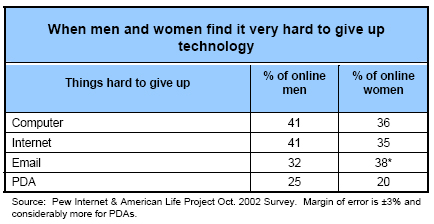
In July 2004, men and women agreed that the internet improved how they did their everyday tasks, like shopping or paying bills, and how they got news they otherwise couldn’t find. In significant numbers, more men than women said the internet improved the way they pursue their hobbies or interests, or their ability to do their job, while more women said that the internet greatly improved their ability to keep in touch with friends and family.
In June 2004, about a third of both men and women agree that when it comes to relying on search engines as a way of finding information, they couldn’t live without them.
